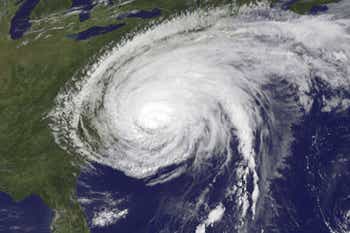Are you prepared for an increase in hurricanes, floods, wildfires and tornadoes?
Natural disasters in the U.S. have increased by 700 percent* since 1950 and reports from the National Oceanic and Atmospheric Administration indicate severe weather events are occurring more frequently.**
The U.S. experienced the largest hurricane to ever form in the Atlantic Basin (Sandy) in 20121. Losses from the "super storm" exceeded $20 billion, making it one of the top 10 costliest hurricanes in U.S. history1. In addition to Hurricane Sandy, the U.S. Government declared 47 other major natural disasters in 20122.
"We can't control the weather, but we can be prepared," said Joanna Moore, Mercury Insurance Group chief claims officer. "When natural disasters strike, Mercury mobilizes an emergency claims team to assist policy holders who suffer property damage. Claims can be reported round-the-clock at (800) 503-3724."
Mercury Insurance, which has been protecting families since 1962, has compiled some insurance tips to help you weather the storm:
- Know what is covered. Review your home and auto insurance policies with an insurance agent who has a good understanding of the severe weather conditions you may experience, such as hail, rain, hurricanes, tornadoes and wildfires. In the case of floods, the Federal government provides homeowners and renters coverage through the National Flood Insurance Program.
A Mercury automobile policy with comprehensive insurance coverage will protect your vehicle from most damages caused by natural disasters, but talk to your agent about additional policies that may be needed.
- Catalog your property. Document your belongings by taking photos or shooting video of your home and possessions, which may expedite your claims process. Store them in a secure place, like a password-protected portable hard drive, and place backup copies in an off-site location.
- Develop an evacuation plan. This should be part of a larger, more comprehensive family emergency plan. Contact your local city official for natural disaster preparation guidelines and evacuation routes. Sit down with your family at least twice a year and practice your plan.
- File an auto or home claim. Contact your insurer immediately to report the loss and do not remove debris or damaged property that may be related to your claim. You'll need to provide information, including your policy number, as well as the date and time the incident occurred.
- Follow-up on a claim. Prepare a detailed inventory of destroyed or damaged property. Offer photos or videos of your home and possessions to your claims adjuster, if these are available. Keep records and receipts for additional living expenses that were incurred if you were forced to leave your home and provide copies to your adjuster.
Additional details can also be found at www.ready.gov and www.FEMA.gov.
*http://www.huffingtonpost.com/2012/10/30/hurricane-sandy-largest-hurricane_n_2045163.html


